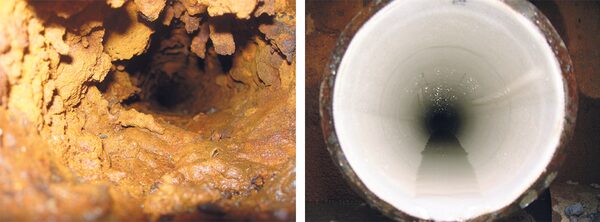
FER-PAL Infrastructure uses innovative technology called Aqua-Pipe, which allows pipes to be refurbished in place without having to be dug up.SUPPLIED
Aging infrastructure is one of the biggest challenges facing municipalities across Canada. Lack of funds in most jurisdictions means some essential services are stretched to breaking point.
For example, the average age of Canada’s potable water pipes is 37 years, according to the current Canadian Infrastructure Report Card. In some municipalities, cast iron pipes were laid up to a century ago and are now badly corroded and leaking.
Digging up pipes to replace or refurbish them, which can be expensive and disruptive, is no longer the only solution thanks to the development by the Quebec firm Sanexen Environmental Services. Its innovative Aqua-Pipe technology allows pipes to be refurbished in place without having to be dug up.
Sanexen, a subsidiary of Montreal’s Logistec Corporation, owns 51 per cent of Toronto-based FER-PAL Infrastructure, which specializes in trenchless water pipe refurbishment for municipalities in Canada and the United States using Sanexen’s Aqua-Pipe product. FER-PAL CEO Shaun McKaigue says municipalities are increasingly looking for cost-effective ways to extend the life of water pipes and reduce the disruption caused when roads are dug up to access the damaged infrastructure.
The technology FER-PAL uses – called cured-in-place pipe (CIPP) – involves the excavation of just one hole to get to the pipe, which is cleaned of rust and other debris and then lined with Aqua-Pipe, which is made up of tubular polyester jackets with the inner jacket bonded onto a polyurethane elastomer.
Apart from overall cost savings and reduced disruption, the trenchless process benefits the environment by avoiding the much larger carbon footprint that would result from cut-and-cover excavation and increased traffic congestion due to road closures.
“Trenchless technology such as CIPP for water main rehabilitation can reduce the carbon footprint by 80 to 90 per cent,” says Mr. McKaigue. “It also prevents future water main breaks and the loss of potable water that has cost money to treat. So that’s another environmental benefit as well as a cost saving.” Achieving acceptance of the technology among municipalities once it was developed involved finding champions, he adds.
“Specifically, municipalities like Hamilton, Toronto and London were early adopters. They could see the long-term benefits through cost savings, less disruption and reduced environmental impact,” says Mr. McKaigue. The technology is now widely used in Canada and the U.S. FER-PAL’s goal is to expand its market further across Canada and deeper into the U.S.
While winning support from municipalities is important, Mr. McKaigue says the company strives to maintain good relationships with the communities where pipe rehabilitation is carried out. “In a way, our customers are the taxpayers who live in the municipalities where we work, and we understand that customer service is important,” he says. “The technology helps reduce disruption, but we still need to make sure that communities are fully informed about what we are doing and why, and when we do that the general reaction is, ‘wow, what a great idea.’”
But Mr. McKaigue believes an equally important wow factor is that Aqua-Pipe is a Canadian success story made possible by Logistec’s long-term view of business and its willingness to invest in research and development. “In typical Canadian fashion, we tend to not blow our horn,” he says. “But this is a great story. Aqua-Pipe was invented in Canada, it’s manufactured in Canada, we are world leaders in the technology and now we are exporting it to the U.S. and, in time, the rest of the world.”
Produced by Randall Anthony Communications. The Globe’s editorial department was not involved in its creation.